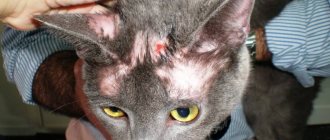Indications for the use of deworming tablets for cats
The most common pests in a cat's body are roundworms. These are parasites that an animal can become infected with on the street, when it digs in the ground, drinks water from a puddle, and at the same time swallows their eggs. The presence of roundworm eggs in soil and sand is not uncommon. Kittens that suck the milk of a sick mother can also get sick.
Favorite
Less common are nematodes, visible only under a microscope (infection occurs when an animal swallows larvae in the ground) and tapeworms (invaded the body when a cat eats infected rodents or birds). The latter are visible in the feces or on the hair around the anus in the form of white fragments resembling grains of rice. It happens that a cat (usually young or with a weakened immune system) will bring back Giardia (a flagellated microorganism) from a walk. They enter the stomach through contaminated raw meat or through ingestion of cysts found in the soil.
Parasites are transmitted:
- by food;
- through the placenta;
- with mother's milk;
- upon contact with feces;
- upon contact with a sick animal;
- through fleas;
- Parasites can be transferred from the yard to the home on a person's shoes.
Roundworms are excreted in feces or vomit. They are easy to notice because they resemble white, rather thick threads 5-10 cm long.
Roundworms are the most common animal parasites
Attention! Many worms do not cause any symptoms, but most often an infected cat suffers from diseases related to the digestive system.
If there are worms, then a serious problem is: chronic diarrhea, vomiting, weight loss, it happens that mucus and blood appear in the stool. The animal may be apathetic, weakened, restless (often wagging its tail), and, depending on the type of parasite, lacking appetite. His fur becomes dull and weak.
The symptoms themselves are not a sufficient reason to diagnose the presence of worms, so if the cat owner suspects an infection, special tests must be performed. The main thing is to examine the stool - it is best to try to collect several samples over 3-4 days and take them to the veterinarian.
Tips and tricks
It is impossible to completely exclude the possibility of cats becoming infected with worms. Since any animal is susceptible to invasion, even those living in apartment conditions. However, it is possible to reduce the risk of helminths.
In addition to drug prevention, follow the following recommendations to reduce the risk of helminthiasis:
- Remove fleas from your pet.
- Disinfect the potty twice a month.
- Store shoes in closed cabinets and cabinets.
- Do not feed your animal raw fish and meat.
- Prevent your cat from having free access to the trash can.
- Limit contact with sick animals.
Helpful Tips:
- Treat a kitten found on the street with anti-worming agents no earlier than 2 weeks later. Make sure he doesn't have any other illnesses.
- Carry out worm prevention with an interval of 2 weeks between vaccination procedures, getting rid of fleas or ticks. Excess medications will lead to intoxication.
- For any changes in the cat's condition, contact a specialist. Self-medication can lead to worsening of the present disease and death.
A disease recognized in time and treatment measures taken can save the life of a pet. Monitor your pet’s health and environment and be sure to take helminth prevention measures. And then the animal will thank you with devoted love, a playful mood and a healthy appearance.
How to feed a cat a pill
How to give a cat deworming tablet and how often to give it
Cat and pills
Having returned from the veterinarian who prescribed medication for their pet, many are faced with the problem of how to give an anthelmintic to the animal. This could be an anti-worm tablet or an antibiotic. It doesn't matter what. It is important how to get a cat to take medicine. After all, unlike a person, an animal does not understand that they are trying to cure it.
- You can hide deworming tablets for cats in food.
It is better to add it to wet food with the addition of sauce. Theoretically, the method is the simplest and least stressful for the cat and the owner. In practice, there is no certainty that the cat will eat the pill.
She can lick the food and leave the deworming tablets for cats in the middle of the bowl. In addition, cats have a very good sense of smell - they sense a foreign odor and refuse to eat.
- You can try giving your cat a dewormer with water.
Dissolve the tablet in water, draw the mixture into a syringe and then inject it into the mouth. Another problem arises: not all anthelmintic drugs for cats can be administered in this way - it is better to ask your veterinarian. If the tablet is very bitter, the result will be vomiting and excessive salivation.
- Right in the mouth.
To avoid harming your pet, you should gently hold his head and lightly squeeze his jaws on the sides so that he opens them. With your other hand, place the tablet as deeply as possible on your tongue.
Forced administration of a pill to a cat
When the cat closes its mouth, after a second, stroke its throat. This will encourage him to swallow the medicine. As soon as he does this, give him time to calm down and try to cuddle him a little.
Important! After administering deworming tablets for cats, it is necessary to give the animal water with a syringe (about 4-5 ml per tablet) to push the medicine into the stomach.
Alternatively, after swallowing the tablet, you can give the cat some wet food or tuna sauce - they will serve the same role - a “bulldozer” pushing the tablet into the stomach.
- It's even better to add dewormers for cats to the delicacy.
Cat hunting sausages are perfect.
Cut it, put an anthelmintic drug in the form of a tablet into one of the pieces, and serve it to the animal. It will be better if the cat eats it himself.
For reference: the choice of method of administering the drug depends on the owner of the animal and the behavioral characteristics of the particular cat.
Only the owner will be able to correctly “persuade” the murka to take the medicine.
Veterinarian recommendations regarding the use of anthelmintics
Any drug should be administered strictly following the dosage, which depends on the cat’s body weight. Below are recommendations from veterinarians regarding the use of anthelmintics.
- Before giving your cat an anthelmintic, you must use flea and tick drops.
- Only healthy cats can be given anthelmintic prophylaxis.
- It is advisable to carry out the treatment on weekends so that you can observe the condition of your four-legged friend.
- 5 hours after the cat has received a dose of the anthelmintic, he needs to be given a small amount of activated carbon.
- In cases of constipation, it is worth lubricating the anus area with Vaseline oil.
- Repeated use of the anthelmintic is possible 15 days after the previous use.
Side effects
Deworming remedy for kittens: what to do
Usually, if the instructions are followed, there should be no side effects.
The owner must give antihelminthic drugs for cats in a strictly defined dose. If you exceed the amount of medicine, poisoning is possible.
Under no circumstances should “adult” tablets be given to small kittens or pregnant cats. Any medications for worming are toxic, especially those that are applied externally, drop by drop, to the withers.
During the treatment period, you should carefully monitor your pet, its well-being, especially control its stool, because medications can cause diarrhea, or vice versa - constipation.
Aerosols against fleas in cats
Insecticidal spray, according to many practicing veterinarians, is the most effective means of instantly getting rid of any parasitic insects: fleas, ticks, lice, lice, etc.
Most often, all aerosols are based on organochlorine compounds (karbofos, dichlorvos, chlorophos, etc.).
When treating a cat with a spray, you must exercise maximum caution so as not to harm the health of the animal, and also monitor your own safety - you can get seriously poisoned. During application, a protective collar is put on the cat, which is left on the pet for 5 minutes to half an hour to prevent licking of the drug
Please note that for cats with long hair, a little more aerosol may be required.
During application, a protective collar is put on the cat, which is left on the pet for 5 minutes to half an hour to prevent licking of the drug. Please note that cats with long hair may require a little more aerosol.
By and large, it is better to use sprays not to treat pets, but to kill insects in the room and places where the animal rests (bedding, sofas and armchairs).
Most popular brands:
- Frontline;
- Hartz;
- Leopard;
- Celandine and others.
Is it possible to give deworming tablets to a pregnant or lactating cat?
Nursing mother
Flea drops for cats: remedy, tablets
It is important to take care of your pregnant cat, providing her with good nutrition and excellent medical care. Always use best breeding practices regarding hygiene and separation of pregnant cats from others, as well as infectious disease research where indicated.
Attention! Deworming a cat during pregnancy is very important, as worms can pass to newborn kittens through the placenta or through milk.
The medications must be safe for the cat during this period. It is best if the names are provided by a veterinarian who knows for sure that the product being used is effective but safe for cats and unborn kittens.
Any supplements, free or ridiculously cheap medications should be avoided as they can be dangerous. You should always consult your veterinarian before giving anything to a pregnant cat. Newborn kittens are completely dependent on milk supplied by their mother during the first four weeks of life - this should not be forgotten when choosing an anti-worming drug.
If a cat in an interesting situation feels normal with the presence of worms, it is better to hold off on worming. It would be correct to do this before mating, like other important vaccinations. Because medications can harm the expectant mother and her children, even causing miscarriages. But, if the worms have tormented the animal, it will still have to be treated. However, under no circumstances should this be done in the last trimester of pregnancy.
The main criterion for choosing an anthelmintic drug for a pet
In fact, neither the price of the drug, nor the form of its release, nor the mechanism of action on parasites play a determining role when choosing a deworming agent.
The main criterion for choosing an anthelmintic for a cat is its relative safety with proven effectiveness. Unfortunately, the most effective anthelmintic drugs are not at all harmless (in particular, to the animal’s liver), and sometimes downright toxic. So, minimizing unwanted side effects is the main task of a caring cat owner when independently choosing an anthelmintic for a pet.
Although modern anthelmintics have a much less pronounced toxic effect than their “ancestors,” none of them are absolutely harmless, since the drugs are still based on potent substances synthesized back in the sixties and seventies of the last century (pyrantel, febantel, mebendazole, praziquantel, ivermectin).
Let’s try to figure out which anthelmintic drug is optimal for your cat, that is, it can provide the necessary effect while being as gentle as possible on the cat’s body.
In this article we will not consider hand-made anthelmintics, since there is currently no medical evidence of the effectiveness of folk anthelmintics for cats.
Review of anthelmintics
There are quite a lot of medicines, including inexpensive ones. What is the best anthelmintic for cats? The following describes the most popular and used ones.
- Kanikvantel plus is a broad-spectrum drug used for the treatment and prevention of invasions. Active ingredients: fenbendazole and praziquantel. Acts against Giardia, nematodes and cestodes. Suitable for adult cats and dogs only.
- Dirofen Plus - deworming tablets for kittens. Prescribed from 3 months of age. This low-risk medicine acts on all phases of worm development and has virtually no side effects. The main thing is that the animal does not have individual intolerance and is not weakened.
- Cats especially like Kanikquantel with the taste of meat and fish. Before using it, the animal should be cleaned of blood-sucking insects. The shelf life is much longer than that of other drugs. Should not be given to pregnant women or kittens.
- Milbemax is used for young and adult cats, only the dosage is different. Helps fight cestodes, trematodes, nematodes. Contraindicated for liver and kidney diseases.
- Drontal is used for the prevention and therapeutic treatment of cats against round and tape helminths. Do not give to kittens and old cats.
- Prazitel is good because it contains olive oil, which protects the animal from intoxication as the parasites decompose inside. The suspension has a pleasant taste and is easily administered to the pet using a syringe.
- Alben is well tolerated by animals of all ages; it is given to dogs and cats once. Contraindicated for pregnant and lactating women.
- Azinox is perhaps the best prevention and treatment of cestodiasis in dogs and cats. Indicated from 3 weeks of age.
- Troncil is given to the animal forcibly or with food and water. For prevention, it is enough to use once every 3 months.
- Milprazone for kittens and cats weighing up to 2 kg. Prescribed for deworming and prevention of diseases caused by larval forms and mature cestodes.
- Cestal Cat with liver flavor is low-toxic and well tolerated by animals. For kittens - from 3 weeks.
Methods of anthelmintic treatment
While drops are easy to use, giving a fluffy purr a pill to an inexperienced owner is not easy. Below are ways that can make this process easier.
- With a tasty treat. After crumbling the tablet, mix it with a small amount of liquid food or animal pate. The cat will not feel the aroma of the tablet and will calmly enjoy the delicacy.
- In liquid form . The pre-crushed tablet is combined with sour cream or kefir. The pet will not be able to refuse its favorite product and will not notice the tablets.
- The whole tablet. The method is not for the faint of heart. Having swaddled the cat well, we place him on his back, which will reduce resistance on his part. By pressing on the lower jaw, we force the pet to open its mouth and place the tablet under the tongue. Having closed the jaw, we move our finger along the pet’s throat, choosing the direction from bottom to top. This provokes the cat to swallow the medicine.
- With a syringe. The crushed drug is combined with water. Having collected the solution into a syringe (without a needle!), pour it into the animal’s oral cavity. We clamp the purr's jaw until it swallows the medicine.
Medicines for kittens
Baby at the doctor
For children, helminths are much more dangerous than for adults, especially since worms parasitize not only in the intestines, but also in the liver, lungs, and even the heart.
Kittens' bodies are less resistant to the harmful effects of parasites. Therefore, treatment should be started for the first time after 3 weeks of life, and then undergo two stages of deworming with an interval of 2 weeks. Kittens can receive subsequent doses of the drug every 3 months.
Complex preparations are much more convenient to use. They are also used in the form of drops on the withers. Many people trust their pets to IN-AP complex. There are good reviews about Prazicide sweet suspension, but it is prescribed individually, once for therapeutic and prophylactic purposes.
Dirofen Plus, described above, has proven itself to be excellent. An effective deworming drug for kittens is Prazitel in the form of a suspension or tablets.
Are cat fleas dangerous for humans?
Cat fleas do not live on people, but they can bite them and thereby transmit the causative agents of some serious diseases.
Among the most dangerous diseases that cause fleas in domestic cats are:
hepatitis - inflammatory damage to the liver; brucellosis – damage to many body systems: cardiovascular, respiratory, digestive, musculoskeletal, nervous, etc.; encephalitis - inflammation of the brain substance; helminths – worms that parasitize the body of animals and humans; Plague is a fatal disease (without treatment it ends in death). It is extremely rare in Russia; the last case was recorded in 2016 in Altai. Those cat owners who export their pets to Central Asia, Africa, and America should be concerned.
It is especially important for them to know how to get rid of fleas from a cat as quickly and efficiently as possible.
The most common consequences of a flea bite for humans are allergic reactions, manifested in the form of severe itching and redness. It is also possible for infection to occur in scratched bite areas. This can already lead to a more serious outcome - purulent inflammation of the skin and penetration of infection into the bloodstream. This development of events is fraught with many dangerous diseases, including sepsis (blood poisoning).
Therefore, flea control is necessary not only to protect the cat from parasitic insects, but also to preserve human health.
How to choose a medicine to fight internal parasites
Roundworms produce a large number of eggs and after just a few generations, the number of parasites can reach enormous values.
If animals are not subject to periodic parasitological testing, the correct course of action is to regularly deworm adult cats using appropriate anthelmintic drugs. Depending on the risk of infection with one or more types of helminths, a drug with a wide or narrow range of action can be selected for therapy.
Veterinarian vs. cat owner: who should choose an anthelmintic for a cat
Experienced cat owners know that antihelminthic drugs in the life of their pets can occur both unexpectedly (when the animal is infected) and plannedly (for preventive purposes).
In the first case, associated with serious risks to the health and even life of the pet, the necessary treatment should be prescribed to it by a qualified specialist who has the results of the relevant tests. Cat owners are not recommended to combat helminthic infestation in animals on their own, since the wrong choice of an anthelmintic or its required therapeutic dose can lead to the death of the pet (for example, from intoxication). The task of a loving owner is to recognize the signs of helminthiasis in a purr in time and immediately contact a veterinarian.
The main signs of helminthiasis in a cat include sudden fluctuations in weight, sudden loss of appetite or atypical gluttony, the presence of a round, swollen abdomen, alternating constipation and diarrhea, frequent vomiting, the habit of “riding” on the butt and excessively licking the area under the tail.
The cat owner can choose a suitable anthelmintic independently, guided by the principle of reasonable expediency, if the cat has no symptoms of infection with parasites, nothing threatens its well-being and the animal simply needs to be dewormed:
- for mandatory prophylaxis, carried out 2–4 times a year;
- before vaccinations;
- simultaneously with flea treatment;
- before mating,
Video: how to determine if a cat has worms
Symptoms of the disease
Of course, before using anthelmintic for cats, you should make sure that worms are the cause of the animal’s poor health. Of course, only a veterinarian can determine the presence of worms in a pet’s body. Therefore, the cat should definitely be taken to the clinic.
Owners should suspect that a pet has parasites in its body if:
- The cat has lost a lot of weight.
- She has vomiting or diarrhea.
- Red spots appeared on the skin under the fur.
- The cat's eyes become purulent or a rash appears on the ears.
Also, some worms in cats cause anemia and weakness.
What types of parasites are there?
Of course, there are quite a lot of varieties of these representatives, but we can highlight the most common ones, which include: trematodes, cestodes and nematoses.
Trematodes
This type of parasite includes lung, liver and fluke worms. Only an anthelmintic for cats against trematodes will not help. In this case, it is necessary for the veterinarian to prescribe comprehensive treatment. If a cat is infected with these worms, then it has a very poor appetite, which alternates with gluttony. The pet develops diarrhea and yellowish vomiting. Once infected with trematodes, your cat begins to experience severe abdominal pain.
Cestodoses
Cestodoses are flatworms that can cause two types of diseases in cats: alveococcosis and dipylidia. Using an anthelmintic, you can remove worms from your pet.
Nematodes
Roundworms are nematodes. They cause hookworm and toxascadia. These parasites can be removed from the cat’s body without the use of complex treatment.
Types of worms © shutterstock










